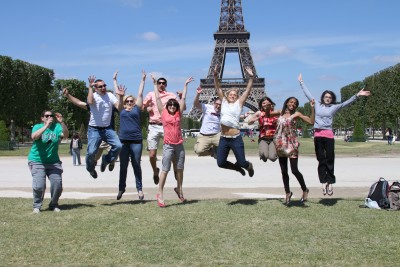
This past May, Neag School of Education faculty member, Alan Marcus, paid tribute to the school’s mission of embracing worldwide diversity by leading a global leader study abroad program as part of a course titled: “Teaching World War II: Multiple Perspectives on the War in Europe.”
The two-week program was designed to immerse students into rich historical and culture experiences, enhance their understanding of international perspectives and facilitate productive teaching strategies for their professional lives. The trip established a foundation for the exploration of teaching history through film and museums, a course the students are enrolled in for this fall.
The Secondary Social Studies Program invited graduating seniors and fifth year integrated bachelor’s/master’s students with concentrations in history to embark on the Western European trip. Dr. David Moss, associate professor in the Neag School of Education, also accompanied the students.
“I learned how to be a culturally aware, sensitive and curious,” said Gabrielle Lataille. “Nothing is free of bias and there are always more questions, details and perspectives that need to be explored…The same event can be interpreted and analyzed in thousands of different ways, depending on who you are, where you live and your surrounding influences and interests.”
The summer experience enabled students to visit historical sites and museums in Great Britain, France and Holland where they investigated the different European perspectives of WWII. The students looked at the museums’ different narratives, interviewed museum staff and critically evaluated historic films to better grasp the war’s impact on global affairs.
“The European perspective of the war is very different from the American perspective,” explained Michael Stroneski. “Americans tend to focus on the battles, the statistics of the war and strategy and machinery. Europeans focus on the humanity of the war. By that I mean they look at the effect the war had on soldiers, families, children and everybody in between. It seems to be more about understanding ‘why’ rather than ‘how.’”
The trip abroad was an eye-opening experience for the 15 Neag student participants, providing them more insight than textbooks or online sources could deliver. Collectively, the travelers attest that their acquired personal anecdotes will be the most powerful classroom reference.
“Passion and the potential for passion in what you teach is the single most incredible tool teachers have in their tool box. Teachers have to bring what they love into the classroom because that honestly is something that students truly do latch on to,” said Adam Nemeroff.
For the students, visiting the WWII sites manifested an appreciation of history, further developing their overall cultural understanding of information and education, alike. For Lataille, it was physically setting foot in Anne Frank’s home where her senses of history and reality aligned.
“After reading the Diary of Anne Frank, I was both in love with the main character and devastated with the outcome of her story. However, it was the actual presence at the house in which she hid for two years that left me with the deep feeling of historical empathy,” she said. “I was able to feel and touch the place in which she experienced love, hope and suffering throughout WWII and the Holocaust, and immediately preceding her tragic torment and death at the concentration camps.”
This particular international experience, alongside other Neag student scholarship and faculty, has been made possible thanks to the generous financial support of Robert E. (M.A. ’51 Ph.D. ’55) and Gladys Dunn. The couple, who has devoted their lives to serve their passion for international studies, granted $100,000 to Neag to assist study and travel abroad for educational development. Some of these funds supported students participating in Marcus’ program.
“Over the years we have had opportunities to travel to all corners of the globe and realize how broadening our experiences have been. The many friendships and memories have enriched our lives, and we think of them every day. Our scholarship is intended to afford Neag students the chance to see first hand what is out there in this amazing world beyond U.S. shores,” said Mrs. Dunn.
Whether their favorite part of the experience was standing on the beaches of Normandy or picnicking in front of the shimmering Eiffel Tower, the trip had an enormous impact on the Neag students.
“We were invited to meet and hear a few of them,” Mr. Dunn said. “It was clear from their remarks that the outcomes that they experienced made as much of an impact on them as we felt. Their backgrounds of mutual understanding and respect earn them the role of citizens of the world who contribute to peace. They are unofficial ambassadors of good will.”
According to Marcus, the trip will change how his students will teach WWII by affecting their approach to teaching empathy across all topics, incorporating their own lessons along the way. To further reinforce the goals of the course, the students will participate in a follow-up journey to Washington D.C. where they will visit the United States Holocaust Memorial Museum, the WWII Memorial, and the National Archives.
“I am optimistic that as teachers they will include field trip experience in the curriculum for their own students and will design effective activities for these trips,” said Marcus. “They certainly understand the power of a successful field trip.”
“This trip opened my eyes, my heart, and my head to so much about the world, education, history, learning, memory, the future, people, diversity, and even happiness. I was challenged in ways I never have been before and I experienced what most do not get to experience in a lifetime,” said Meaghan Davis. “I was constantly learning, thinking, and asking questions. I reflected on this trip as a student, as a future teacher, as an American, as a 21-year-old, as a woman, as a history dork, as a human being and more.”
For more information on “Teaching World War II: Multiple Perspectives on the War in Europe,” contact Professor Marcus at alan.marcus@uconn.edu.
 Facebook
Facebook
 Twitter
Twitter
 LinkedIn
LinkedIn
